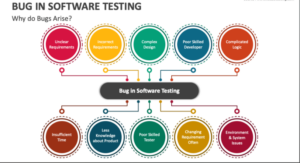Mobile testing or mobile application testing is a process in which the application software developed for mobile is tested for the functionality, usability and consistency. In a highly competitive global market mobile development cycle or process is a short period. To ensure long term success the app must be tested over different combinations of platforms, operating system and networks before launching to global.
The mobile automation testing is very effective technique to test the mobile applications. The key challenges for mobile testing are:
- It must be downloadable: Any applications developed must be available in any platform.
- Diversity in mobile platforms: There are different mobile operating systems in the market like android, windows. The hardware configurations, features, user interface, operability of mobile devices are different. It is difficult to test the single application over multiple devices running on the same platform.
- Device availability: Access to the right set of devices when there is many available devices with variety of platforms is a real challenge in mobile application testing.
- Mobile network operators: There are around 400 different network operators in the world in which CDMA and GSM are the types each network operator uses different kind of network infrastructure and limits the flow of information.
- Scripting: Many devices make executing a test script a key challenge. As devices differ in key strokes, input methods, menu structure and display properties single script does not function for every device.
- Choosing how to test: There are two testing ways of mobile application: testing on real device and testing on emulators. Emulators will miss the issues that can be found only in real device.
- Compatibility: It is necessary to test the compatibility of the mobile application on different devices. An application that works on high resolution may not work on lower resolution.
- Should be able to pick up the phone: While executing the application it should be possible to pick up the phone if call comes.
- Variety of mobile devices: Mobile devices differ in input methods and have different hardware capabilities.




























9 Responses
Mobile testing :is a process in which the application software developed for mobile is tested for the functionality, usability and consistency.To ensure long term success the app must be tested over different combinations of platforms, operating system and networks before launching to global.
key challenges for mobile testing are:
Multitude Mobile Devices, Device Fragmentation & Various OS Platforms, Different Mobile App Types,Numerous Test Interfaces,Variety of Testing Tools.
It must be downloadable in any platform.
Diversity in mobile platforms: There are different mobile operating systems in the market like android, windows. The hardware configurations, features, user interface, operability of mobile devices are different. It is difficult to test the single application over multiple devices running on the same platform.
Device availability: Access to the right set of devices when there is many available devices with variety of platforms is a real challenge in mobile application testing.
Mobile network operators: There are around 400 different network operators in the world in which CDMA and GSM are the types each network operator uses a different kind of network infrastructure and limits the flow of information.
Scripting: Many devices make executing a test script a key challenge. As devices differ in keystrokes, input methods, menu structure, and display properties single script does not function for every device.
Choosing how to test: There are two testing ways of mobile application: testing on real device and testing on emulators. Emulators will miss the issues that can be found only in the real device.
Compatibility: It is necessary to test the compatibility of the mobile application on different devices. An application that works on a high resolution may not work on the lower resolution.
Should be able to pick up the phone: While executing the application it should be possible to pick up the phone if the call comes.
Variety of mobile devices: Mobile devices differ in input methods and have different hardware capabilities.
Types of mobile application testing:
The functionality of a mobile application: should be tested prior to release. Whatever a mobile app’s main purpose is, the purpose should be tested for exceptions.
performance testing of the mobile application: to test the performance of the application such as bad network, low coverage, low memory. Performance can be affected from two sides, that is, either from the application server side and client server side.
Memory leakage testing: It happens when the mobile application is unable to manage the memory due to incorrect programming, during the execution of the program . This results in poor performance and slows down the system.
Interruption testing: is to test the ability of the application to handle the interruptions like incoming calls and network coverage outage and recovery.
Usability testing: Usability is done to check whether the application is achieving its goals and is getting favorable responses from the user and is user-friendly.
Installation testing: This testing is done to verify that any installation of the application in the device goes smoothly without any difficulty.
Certification testing: To get a certificate every mobile device has to be tested with different platforms.
Block box testing: the tester tests the functionality of the application without knowing the internal coding logic of the application.
Advantages of Mobile application testing: To check the functionality and user interface of an application, it needs to be tested on a large number of popular devices.it helps save costs related to infrastructure and boosts the quality of the application. device matrix and technology, security challenges while transferring data, and support provided for software and devices.
Mobile testing is a process in which the application software developed for mobile .
Mobile application testing can be an automated or manual type of testing.
types:
Functional Testing
Usability Testing
Compatibility Testing
Performance and load testing
Security Testing
Installation Testing
Mobile testing or mobile application testing is a process in which the application software developed for mobile is tested for the functionality, usability and consistency.
Mobile testing or mobile application testing is a process in which the application software developed for mobile is tested for the functionality, usability and consistency. In a highly competitive global market mobile development cycle or process is a short period. To ensure long term success the app must be tested over different combinations of platforms, operating system and networks before launching to global.
It is a process in which the application software developed for mobile is tested for the functionality, usability and consistency.
Some of the key challenges for mobile testing are that it must be downloadable: Any applications developed must be available in any platform and that there i diversity in mobile platforms: There are different mobile operating systems in the market like android, windows.
Mobile testing is is a process in which mobile application software is tested for functionality, usability and consistency. The challenges of mobile testing include issues stemming from variance in devices and requirements for each device. These key challenges are:
a.) Being downloadable across many platforms
b.) Diversity on platforms
c.) Device Availability
d.) Mobile Network Operators
e.) Scripting
f.) Choosing an emulator or a real device
g.) Compatibility
h.) Being able to pick up the phone while using the application
i.) The variety of mobile devices
Explain any other types of mobile testing?
Functional testing: Is to test each functionality in detail and depth with different steps and data.
Capability testing: is a type of non-functional testing that is critical to ensure your mobile app works on various operating systems, devices and applications, network environments, and with particular internal hardware specifications.
Load testing: is to test the performance of the software with different number of users and identify the maximum number of users supported by the software.
Performance testing: Performance testing checks how well the mobile application performs under a particular workload. These tests are important to ensure your app isn’t malfunctioning. Also, is to test the speed and how efficiency of software.
Security testing: is to test the security feature of software.
What are the advantages of mobile testing?
Advantage are to know the compatibility and functionality, usability and consistency.
How different is the mobile testing from other testing?
In mobile testing the app must be tested over different combinations of platforms, operating system and networks before launching to global.
Mobile testing or mobile application testing is a process in which the application software developed to test the functionality, usability and consistency for a mobile device. It is usually developed for short terms but to ensure longivity the app must be tested over different combinations of platforms, operating system and networks before release into the global market.
Black box testing: The tester tests the functionality of the application without knowing the internal coding logic of the application.
Moblle apps are designed to serve more users and more diverse devices than web apps.